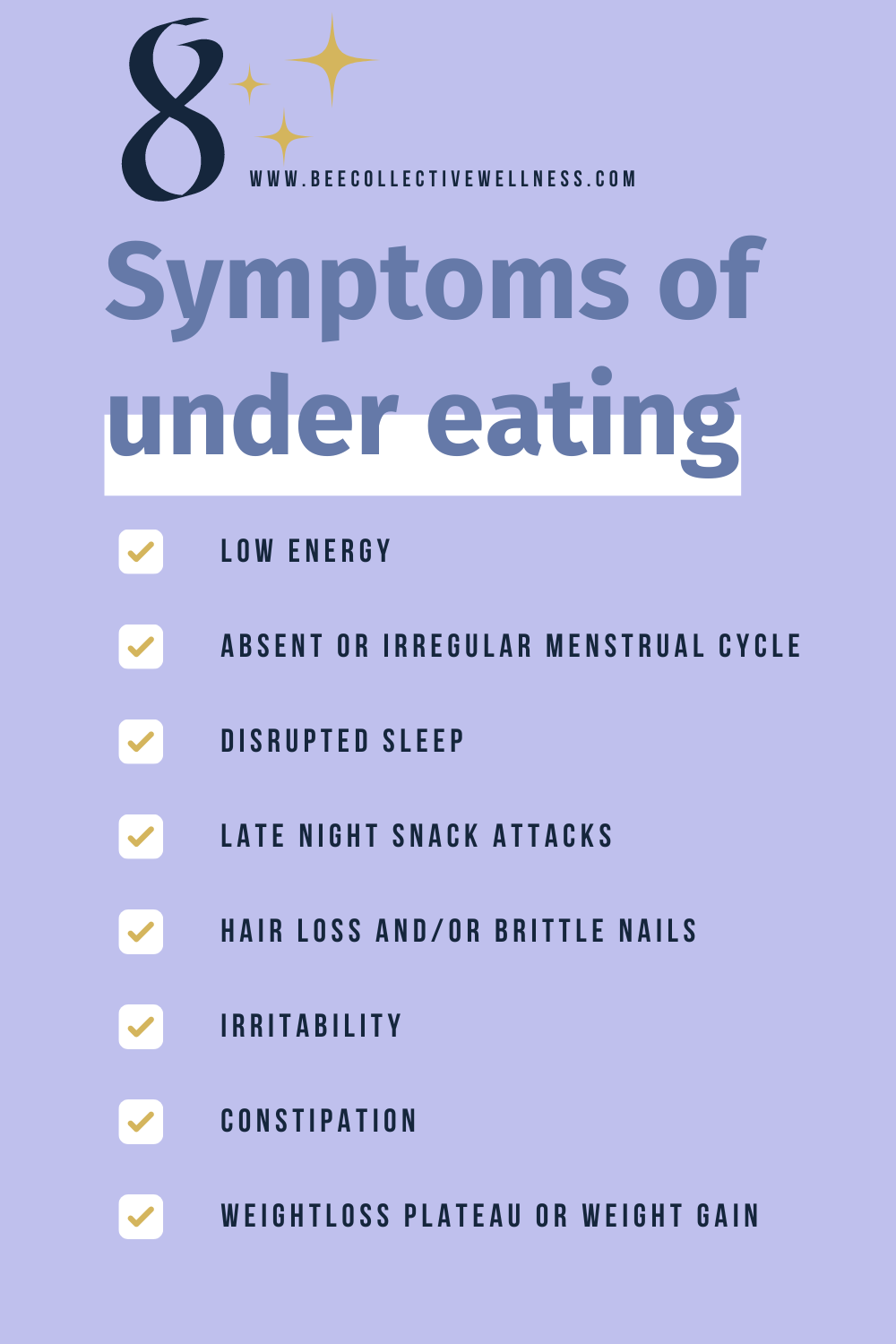
8 Subtle Signs That You May Be Under Eating
Sep 02, 2022To lose weight, you must expend more calories than which you consume, right? Not necessarily! Diet culture has us believing that calories are evil and must be restricted. But not all calories are created equal and you might, in fact, be undereating.
What is a Calorie?
Calories are a unit of energy. We consume calories in the foods we eat and we burn calories just by being alive - heart beating, breathing, digestion, etc. All of those actions utilize calories. We can increase our caloric expenditure by increasing our movement throughout the day as well. The problem occurs with chronically undereating (and often over-exercising).
Calories and The Metabolism
The metabolism efficiently utilizes the energy it has been given in the form of calories to support the body and its needs. Nutrient-dense, whole foods provide more micro- and phyto- nutrients to the body as compared to highly-processed and sugary foods. For example, 100 calories of strawberries have a wildly different nutritional profile than 100 calories of Sour Patch Kids.
When the body experiences a long period of caloric restriction (longer than 3 months) the metabolism will slow down to compensate for the lack of fuel (calories). The body prioritizes the fuel to be utilized for essential life activities while conserving energy on the non-essential activities - reproduction, hair growth, weight loss, and more.
How Does Long-Term Calorie Restriction Affect the Body?
With all of the noise out there from diet culture, it’s hard to know how to appropriately fuel your body. More than likely, your body is giving you subtle messages in the form of symptoms to warn you of something being off. It’s also important to note that under-fueling can have a domino effect on your cortisol levels, thyroid health, sex hormones, and gut health as nutritional deficiencies often accompany caloric restriction. Check out these eight subtle signs that you might be undereating.
8 Subtle Signs That You May Be Under-Eating
1. Low Energy
Again, calories provide energy to the body. When you are undereating, there are not enough resources to make you feel energized and vibrant. This is especially important regarding workouts. Feeling completely tanked a few hours after a workout is a sure sign that you need to increase your caloric intake.
2. Irregular or Absent Menstrual Cycles
If you are a woman of cycling age and are not using any birth control, you should be having a period about every 26-35 days. If your period has suddenly gone missing or your cycle lengths have become wonky you might not be providing your body with enough food for reproduction/hormone creation to be prioritized. Unfortunately, missing periods are very common among woman athletes that may be over-training as well.
3. Disrupted Sleep
If you're waking up in the middle of the night it could be due to the fact that you did not eat enough during the day to support your blood sugar levels overnight. When blood sugar levels drop, cortisol rises to trigger the creation of glucose from protein and fat by a process known as gluconeogenesis. When cortisol rises, it also wakes you up.
4. Late-Night Snack Attack
Do you find yourself turning into a snack monster in the evening? It's time to assess if you gave your body enough energy throughout the day. Carbs are a quick energy source for the body. As it so happens, most snacky options are mainly carbs as well. When the body has been deprived of calories, carb cravings will kick in. Eating more throughout the day can help reduce late-night cravings.
5. Hair Loss and/or Brittle Nails
Hair and nails require protein, essential fatty acids, vitamins, and minerals to grow long, strong, and lush. When not enough calories are consumed, there are not adequate nutrients to support healthy hair and nails.
6. Irritability AKA Hanger
If you frequently find yourself apologizing for your snappy attitude because you were hungry, you might want to consider increasing your calories at mealtime or including snacks. A well-balanced meal of fats, carbs, and protein should sustain you for 3-4 hours.
7. Constipation
When food goes in, food must come out. But when you not eating enough, your transit time can slow leaving you constipated. Fiber plays an important role in bowel motility as well. If you are undereating, you are likely not consuming the recommended 24 grams of fiber per day.
8. Weightloss Plateau or Weight Gain
A calorie restriction for greater than 3 months can slow the metabolism in order to appropriately meet the demands of the body’s essential tasks. That means that it will start to store instead of burn any extra calories in order to conserve energy for a perceived famine in the future. In order to see weight loss while already restricting, you would need to further restrict calories. That tactic will work until the metabolism slows to compensate again for the lack of nutrients, making calorie restriction not sustainable.
I’ve been restricting calories and have many of these symptoms, now what?
Good news! Your metabolism isn’t broken, it just needs to be revived with reverse dieting. Reverse dieting is done by slowly increasing your caloric intake with nutrient-dense foods to support the demands of your body. By giving your body more fuel sources, the metabolism will burn faster and more efficiently. The key is to increase slowly and to listen to your hunger and satiety cues. Addressing any other hormonal or gut imbalances caused by nutritional deficiencies is imperative to nixing these symptoms as well. Want some assistance? I can help! Book a Collective Wellness Strategy Session now to learn more about my approach to sustainable health through nutrition.

*The information available on this website is for general health information only and is not intended to be a substitute for professional medical advice, diagnosis, or treatment. You should not rely exclusively on information provided on the Website for your health needs. You can read more about our disclaimer here.*
Are you overwhelmed by all of the conflicting information regarding health, hormones, nutrition, and weight management?
Join me once a month for a FREE "Ask Me Anything" live Zoom sesh! I'll answer all the questions you've been spending so much time searching the internet for.









